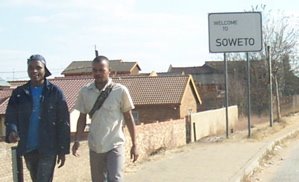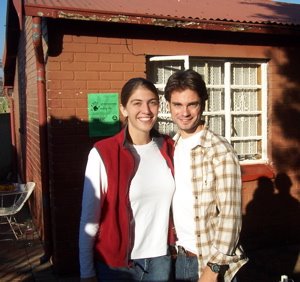kicked by a gorilla
A few weeks ago, with Corrie's parents and grandma in town, we took part in the most hallowed of Rwanda tourist experiences. Gorilla treking.
There are 700 mountain gorillas in the world, all hanging out on the border of Rwanda, Uganda, and the Congo (everybody check your maps now). A small number of those 700 are used to seeing people so you can visit them. I've never heard of anybody venturing into the Congo to see gorillas ('cause you're more likely to run into guerillas than gorillas).
The thing here is that you're not in a zoo. There are no fences, no concession stands. Our "path" was an elephant's track -- elephants apparently don't go around trees, just knock down the ones in their way, leaving a nice path toward the gorillas.
Then you're guide tells you you'll stay 7 meters away at all times and you think, "hey twenty-five feet that's really close!" And then he walks you right up to 7 feet away from a 500 pound gorilla. It's awesome. And he's so cute and soft and you had a gorilla stuffed animal when you were young so you just want to go hug him. And then you remember he's a 500 pound gorilla.
So there we were watching one of the big males doing his thing. And he decided he'd like to be where we were. So he came over to us, turned around, and stuck out his foot into my gut to push me out of the way. Being in the front of our little homosapien pack, I pushed back into the mass and knocked down Grandma (oops!). Then our gorilla grabbed our guide by the shirt and pulled him down to the ground.
"Playful" they call this. It was awesome.












